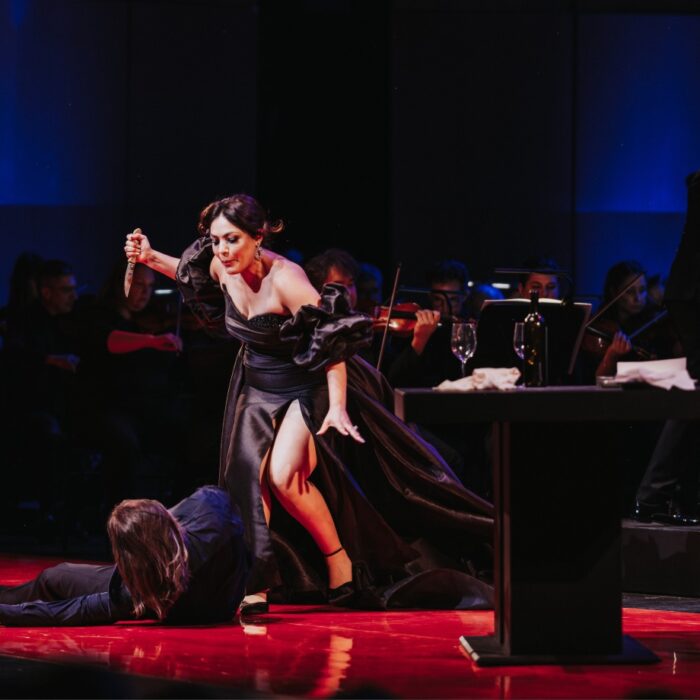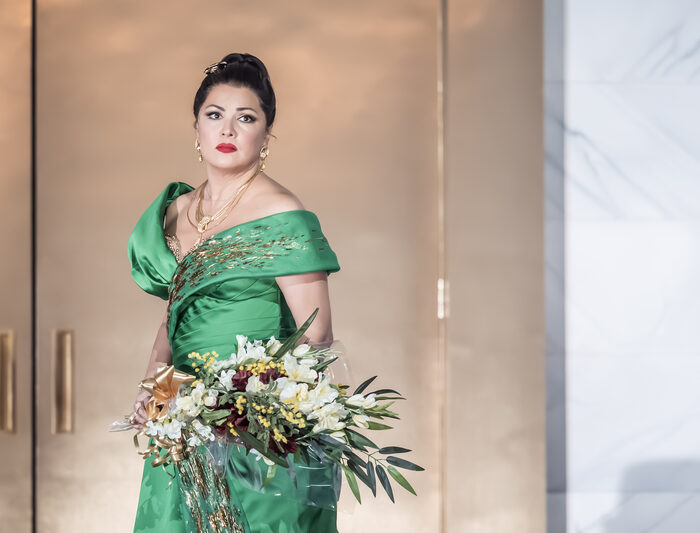
Premiere Opera Foundation & NYIOP 2019 International Vocal Competition Review: Finals Concert
By Logan MartellSaturday, December 7, 2019, saw the finals concert of Premiere Opera Foundation and NYIOP’s International Vocal Competition. The 20 finalists gathered in the resonant First Christian Science Church to share their artistic gifts before a live audience and a panel of distinguished judges, including Paul Hopper of the Metropolitan Opera, Gerald Martin Moore of the Glyndebourne Festival, Pamela Walsh of the New York Philharmonic, Ken Benson of the Juilliard School, and more.
The evening’s competition was opened with statements from Eric Margiore and David Blackburn, presidents of Premiere Opera Foundation and NYIOP, respectively, as they spoke of the process and inspiration that brought the event into fruition.
Now entering the third years of its vocal competition, Premiere Opera Foundation has awarded $50k in prizes, grants, and classes for emerging artists. According to Blackburn, NYIOP’s goal is to bring some of Europe’s most prominent managers to the United States, allowing for artists in America to audition without requiring expensive tours through Europe.
With both organizations’ events happening so closely together, they decided to roll both the professional auditions and voice competition into one charged event.
The Artists
First of the artists was soprano Nina Mutalif, with “Io son l’umile ancella” from Cilea’s “Adriana Lecouvreur.” The gently-fluttering accompaniment was joined by Mutalif’s lovely sustained tones as she began the modest phrases of the text. Rising softly, these feelings reached a relaxed, touching height with her phrase “mi chiamo fedelta,” before she brought the number to a delicate close.
Next up was baritone Tim Murray, singing “Hai gia vinta la causa,” from Mozart’s “Le Nozze di Figaro.” His strong, energetic voice carried through the opening recitative and its sforzando chords. Murray displayed vocal colors ranging from scornful to confident, making for an impactful shift when his surprise at guessing the next step in Figaro’s plan burst onto his face. Reaffirming his own desires as the number ran to its end, Murray also gave a glimpse of his vocal ability to hit higher notes with a fine ease.
Following this was mezzo-soprano Michaela Wolz, with “Parto, ma tu ben mio” from Mozart’s “La Clemenza di Tito.” Wolz showed vocal refinement, with her emotions conveyed clearly as the measured leaps gave way to gorgeously tapering sentiments. As the tempo rose, Wolz’s rapid phrases led into a series of quick, well-handled ornaments bolstered by her highly-taken expression.
Next was soprano Tatev Baroyan, singing the Snow Maiden’s prologue aria from Rimsky Kosakov’s “The Snow Maiden.” The rejoicing, warm quality of her voice worked well with the venue as her series of calls reverberated with a lovely ease. Her brisk, excited phrases lifted her from the tumult of the middle section as she worked up to a soaring conclusion.
Singing “Amfortas! Die Wunde!” from Wagner’s “Parsifal” was tenor Kevin Ray. The heightened, dissonant opening of the accompaniment was joined by Ray’s rich dramatic power. His strong, sustained suffering gave way to awed phrases that nicely evoked the perspective-opening vision Parsifal experiences. By the end of the number, Ray’s vocal outpouring was matched by his wearied expression which highlighted just how deeply these emotions were felt.
Following this was mezzo-soprano Carolyn Sproule, singing “Sgombra e la sacra selva” from Bellini’s Norma. With her rich mezzo supported by her clear Italian diction, Sproule’s rendition was full of disconsolate beauty. This reflective number saw the accompaniment draw in and out, with Sproule able to fill the silence with captivating softness.
Next was baritone Joo Won Kang, singing “Cento leggiadre vergini” from Verdi’s “Il Corsaro.” His firm, commanding colors worked nicely with the spurned phrases of the text, with the following section allowing for a more thoughtful legato. Leading to a livelier end, Kang strongly carried the weight of his feelings through the shifting moods, with his falling duplets working towards a rich conclusion.
After this came soprano Alexandra Razskazoff, singing “Come in quest’ora bruna” from Verdi’s “Simon Boccanegra.” The youthful tones of her opening soon rose to an elegant height which her vocal leaps easily pivoted back towards. Her passionate phrases lasted through the punctuating dissonance of the accompaniment, with her graceful climax diminishing into silence.
Following her was baritone Denis Milo, singing Onegin’s aria from Tchaikovsky’s “Eugene Onegin.” His colder, guarded tones, supported by his restrained bearing, made for a fascinating opening as we see him gather his thoughts for his rejection of Tatiana in the next section. The touching affection that colored his voice did not take away from its richness, these feelings and colors ultimately blending into a warm, yet distant resolve.
Next was tenor Joseph Tancredi, singing “Di rigori armato” from Richard Strauss’ “Der Rosenkavalier.” He quickly displayed a remarkable sweetness of voice, able to easily rise to a relaxed, near-spinto quality before drawing his phrases to a softly-controlled close, belied by the excitement on his face which lasted through much of this brief, passionate number.
Then came baritone Bryan Murray, singing “Pierot’s Tanzlied” from Korngold’s “Die Tote Stadt.” His tied opening phrases carrying a touching sentiment which featured a number of delicate leaps that Murray handled gracefully. The next section revisited the earlier material with a stronger passion that swelled towards a striking high G, with Murray carrying these feelings as his loving phrases circled with intoxicating softness.
Soprano Victoria Davis followed, singing “Do Not Utter a Word” from Barber’s “Vanessa.” The unsettled accompaniment nicely accented Davis’ lush tones of warning, unease, and powerful longing; she displayed an urgent power and great support for her voice as she took it to electric heights.
Following this was baritone Jianan Huang, with “O Carlo ascolta” from Verdi’s “Don Carlo.” The introduction featured imploring tones which transitioned towards a highly-pleasing legato in the next sections, all of this bolstered by Huang’s dramatic sense and taken expression.
After that, soprano Quan Chen took on “Un bel di vedremo” from Puccini’s “Madama Butterfly.” Her hopeful tones expressed Butterfly’s faithful nature, ranging from a frantic excitement to a more conversational quality as the accompaniment made itself scarcer. These feelings came together for a highly-passionate conclusion.
The next finalist was mezzo-soprano Polixeni Tziouvaras, singing “O ma lyre immortelle” from Gounod’s “Sapho.” Her rendition was balanced between her polished voice and the way she interacted with her thoughts and surroundings, her observing phrases featuring a nice plunge into her lower register. These expressive vocal and dramatic qualities led towards a strong, luxurious close.
Following this was soprano Amanda Palmeiro, with “amour ranime mon courage” from Gounod’s “Romeo et Juliette.” Opening with quick passion, her early, sustained peaks featured a controlled descent which led into sharply-executed ornaments. As she considered Juliette’s death-like sleep in the funeral vaults, Palmeiro’s expression was nicely tinted with shades of fear and uncertainty before she dispelled them with a powerful flair.
Next was soprano Monica Dewey, singing “Caro nome” from Verdi’s “Rigoletto.” Her lovely, bright opening gave way to infatuating vocal heights, illuminated all the more by her dramatic sense and graceful use of her whistle register which led into a highly appealing cadenza.
After this was baritone Kidon Choi, singing “Cortigiani, vil razza dannata” from “Rigoletto.” His frantic energy and care for Gilda made for a captivating mixture of emotions and vocal shades. The jester’s helplessness saw Choi ease into an affectionate and vulnerable state, featuring softly-aching tones that led to a crushed, sustained close.
Countertenor Gamaliel Reynoso Mejia then performed the “Refugee’s Aria” from Jonathan Dove’s “Flight.” Based on the life of Mehran Karimi Nasseri, who lived at the Charles de Gaulle Airport for several years, this aria saw Mejia open with lower, fearful lines as he outlined the dawn surroundings of the text. This atmosphere was supported by Mejia’s haunting sustain before he and the accompaniment rose with grim, dramatic weight. This number ended as Mejia grippingly tapered into silence.
The final artist was soprano Elisabeth Rosenberg, singing “Einsam in truben Tagen” from Wagner’s “Lohengrin.” Recounting Elsa’s vision of a God-sent knight, Rosenberg displayed a full and warm soprano through her shyer, legato phrases, swelling into a rejoicing show of faith and vocal beauty. Mustering herself physically, her bolder measures eased back into a pious, touching close.
As the judges deliberated and the audience cast their votes for fan favorite, they were treated to a few musical numbers by pianist Michael Fennelly to pass the time as people chattered, such as Gershwin’s “Rhapsody in Blue,” later being joined by semi-finalist Merissa Beddows for an endearing rendition of “O mio babbino caro” from Puccini’s “Gianni Schicchi.”
The Prizes
This evening saw a number of prizes awarded for classes, voice consultations, encouragement, and more.
Winners of consultation prizes included Michaela Wolz, Tim Murray, Victoria Davis, Joseph Tancredi, Merissa Beddows, Alexandra Razskazoff, Tatev Baroyan, and Amanda Palmeiro.
The Puccini Ambassador Medal went to Quan Chen, the Giordani Marcello Award Prize to Carolyn Sproule, and the Dmitri Hvorostovsky Memorial Career Grant to Monica Dewey.
The Voce di Meche Encouragement Award went to Polixeni Tziouvaras, while the Dr. David Dichiera Encouragement Award went to Joseph Tancredi.
Finally, the Edward Rosen Memorial Grand Prize went to Bryan Murray. Having also received the first place in another competition two days prior, Murray has proven himself as a rising artist of great potential.
With so many talented artists being rewarded for their musical gifts, this year’s International Vocal Competition continues to be an enriching experience for all.



